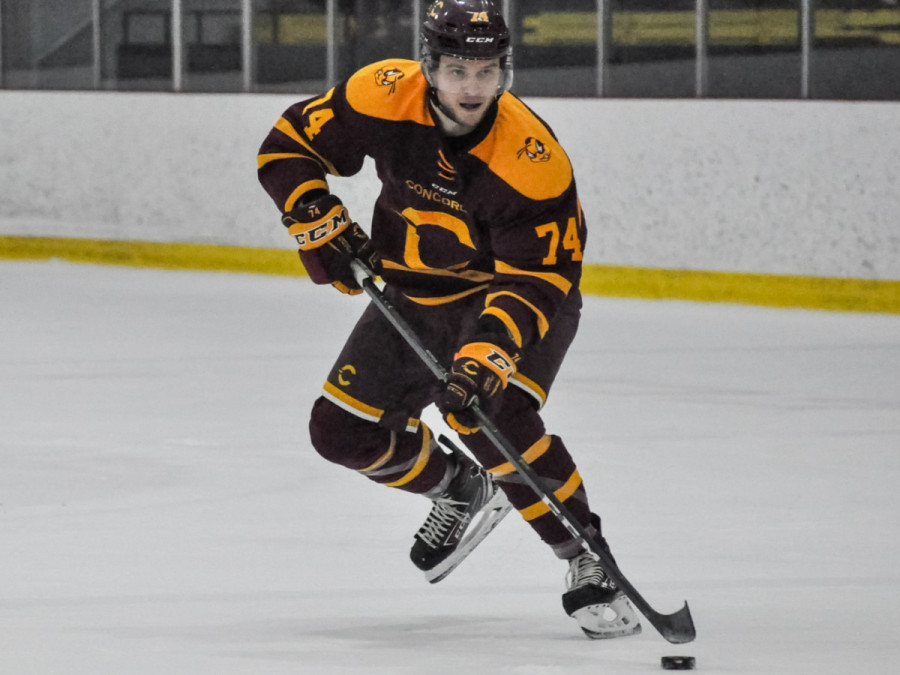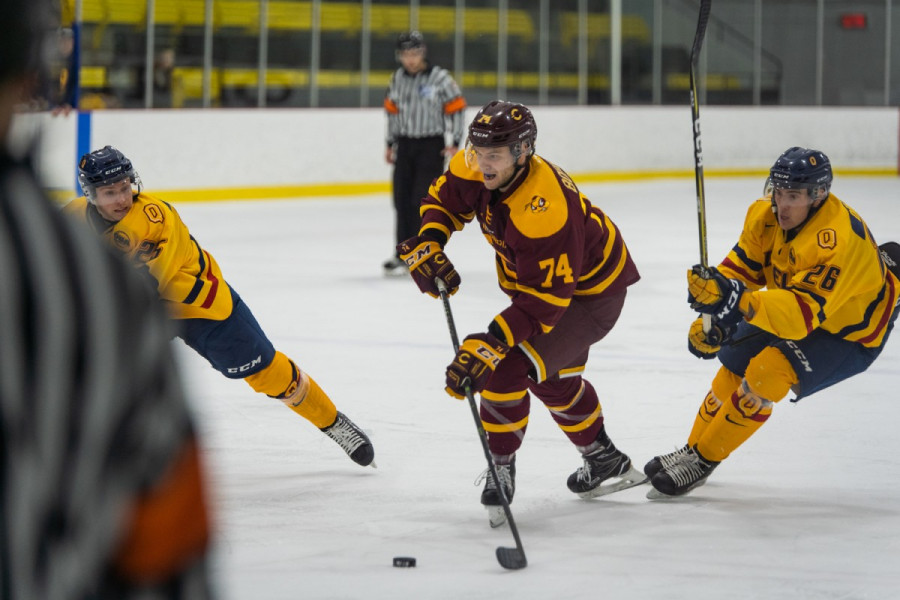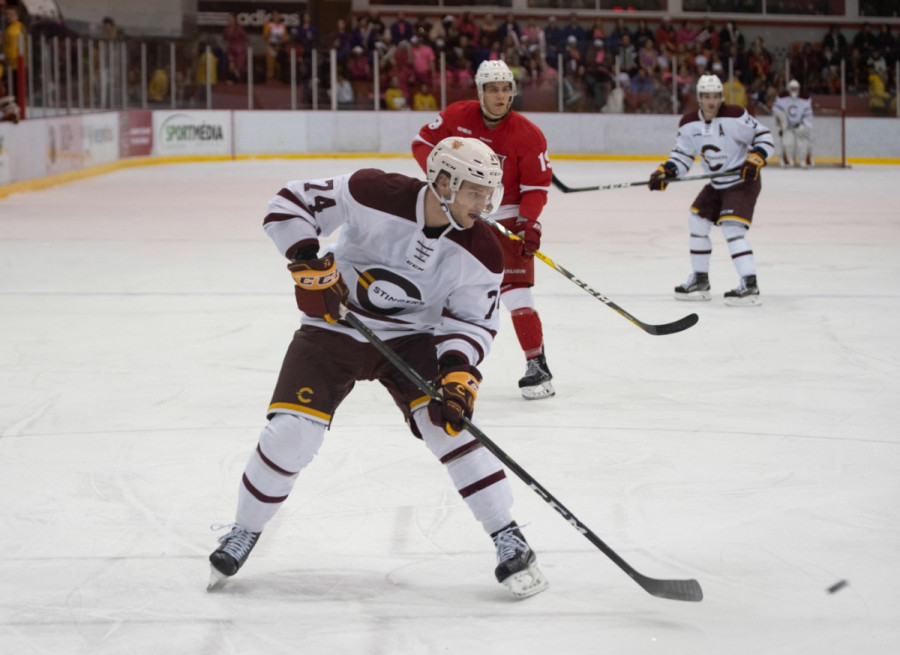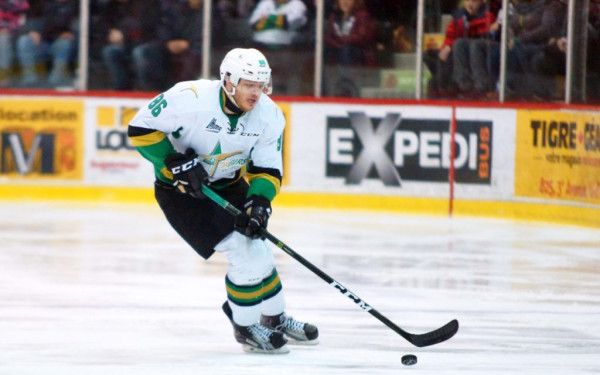Simon Bourque Planning for Future After a Tough Year
Former Habs Draft Choice Working Towards a Degree Away from Pro Hockey
It was late in the second period of a clash between the Concordia Stingers and the Queen’s Golden Gaels when it happened.
Queen’s, a top team in the Ontario University Athletics, found themselves up 2-1, but on the penalty kill thanks to a tripping call.
It took nine seconds. The puck found its way onto defenceman Carl Neill’s stick, who slid it to rookie Simon Bourque, who was waiting at the top of the circle, stick cocked. His heavy shot found twine, beating the goaltender and tying a game the Stingers would go on to win—their ninth victory in 11 games. That goal was Bourque’s first career U Sports goal.
The former Montreal Canadiens draft pick is a long way from where he was in the early fall— traded from his hometown team’s system to the Winnipeg Jets. In early October, the 22-year-old terminated his contract with the Jets. He decided to take some time away from what had been a difficult start to his professional career and to go back to school and get himself a degree before returning to the world of pro hockey.
“It was difficult. I dreamed of an NHL contract all my life. I had it but I think it was a decision I had to make for my future,” said Bourque.
That choice has proved fruitful. Bourque started his classes towards a degree in management, and has been having an immediate impact on the ice, with six points in his first seven U Sports games. He’s also quickly earned the respect of his teammates and coaches, who have nothing but praise for how quickly the former Habs sixth round draft pick has adjusted to the university game.
That includes a former rival of his from his days in the Quebec Major Junior Hockey League.
Now teammates, the often top pairing defensive partners Bourque and Neill used to be less than friendly when captaining the Rimouski Océanic and Sherbrooke Phoenix respectively in the QMJHL. The two teams had a strong rivalry, which made for some heated battles between the two captains who now sit next to each other in the Concordia locker room.
Now, Neill says he’s happy to be playing alongside his former rival, praising his on-ice vision and ability to elevate his teammates’ games.
“He’s really sound defensively, and he brings a good puck moving game too. It’s easy to play with a guy like that who’s always got your back; he’s always in the right position at the right time,” said Neill.
His set of skills have earned Bourque plenty of success over the years. There’s a reason the Stingers were excited to be bringing in the blue chip rookie in January. He’s a two-time QMJHL champion, winning the President’s Cup in 2015, the same year he was drafted, and then again in 2017. He scored 149 points in 248 games during his time in the QMJHL, including 56 in 59 games in his final year of major junior.
Bourque had years of success under his belt. His style of play and skill always served him well in his hockey career.
Then he hit the pros.
“There’s a lot of hockey players who end up at 28, 29 without a degree or anything. They try and get a job but nowadays finding a job without a degree is pretty hard. Not every hockey player in the world is going to make it to the NHL.” — Simon Bourque
Bourque aged out of major junior hockey and found himself with the American Hockey League affiliate of the Canadiens, the Laval Rocket, just one step below the NHL. It was his first true taste of the life of a full time professional player and it was something completely different than what the young defenceman had experienced so far.
“Pro hockey is a tough business. Personally I don’t think I was ready for everything that came with it,” explained Bourque.
He found himself sitting as a healthy scratch much of the year, playing only 46 of the team’s 82 games. He could never find his production, putting up only three assists during that time and no goals. It was a difficult year on the ice, but it was perhaps even tougher for Bourque mentally. This was not a problem he was used to. The jump from junior to professional hockey is rarely, if ever, easy.
“I couldn’t understand why I couldn’t get a shot. All my life I played the same way and it worked. So I couldn’t see why, now that I was going to pro hockey, I had to change everything. My shot, my skating, everything,” Bourque expressed. “Mentally it broke me down. I didn’t understand. I had a lot of questions with barely [any] answers.”
In a poor state of mind, confidence lacking after a tough year, Bourque suddenly found another hit coming his way. He was traded as a part of a package deal with the Winnipeg Jets at the end of June 2018. Before the season began, he made his decision and he was suddenly away from professional hockey, without a team for the first time since he started organized hockey.
When it was clear he wanted to approach the U Sports route he was courted by McGill among other teams. It seemed that Concordia’s crosstown rivals would be getting themselves a new defenceman—until Bourque sat down for a dinner with Stingers head coach Marc-André Élement.
Over sushi, the two talked hockey and Bourque’s game. He said what convinced him Concordia was the school for him was the relationship he built with the coach that night. Élement told Bourque he knew he had talent and all he wanted was for Bourque to come to Concordia, have fun playing hockey, and play the game he always had—the game that had made him successful in the past.
It was everything that had been lacking in Laval.
“I couldn’t ask for more, that’s really what I wanted to do,” said Bourque, who has since earned the trust of Élement and his coaching staff.
Now, Bourque’s gotten comfortable on the ice and off, serving as a vocal leader for his new teammates.

“He’s always here early, he’s not [too] shy to talk, he’s a really good leader. He’s bringing his experience into the locker room and it’s great for the program,” Élement said.
While he’s enjoying the on-ice success and comfort, a major focus and reason that Bourque joined the U Sports ranks was because he wanted to get his bachelor’s. The young defenceman is planning to return to the professional ranks eventually, but says he wants to keep focus on his education first.
He enjoyed school in the past and is doing so now, appreciating an aspect of his life that takes his mind off of hockey for awhile when away from the rink. He’s hoping other players will start to do the same and understand just how useful a university degree can be.
“There’s a lot of hockey players who end up at 28, 29 without a degree or anything. They try and get a job but nowadays finding a job without a degree is pretty hard,” said Bourque. “Not every hockey player in the world is going to make it to the NHL.”
Neill is in a similar position to his teammate. A highly sought after player by university programs, Neill has also had professional offers that he’s chosen to turn down to finish his degree before heading into the world. He knows that the league he’s playing in is a chance for him to show scouts he’s got talent while still finishing his education. Neill believes pro offers will come again in the future as they have in the past.
“It takes a few guys to break the ice and decide ‘OK school first, pro after.’ Even though it might be the hard thing to do because your whole life you grow up wanting to be a pro hockey player,” said Neill. “It’s starting to be a reoccuring theme now […] guys are starting to value education a lot more.”
When it comes to recruiting 20-year-old players graduating from the major junior leagues, the Stingers coaching staff are already using Neill and Bourque as examples when explaining the benefits of student athlete life to potential recruits. Seeing top players with professional experience and opportunities makes getting a degree while playing a lot more attractive as an option.
Between school and hockey, Bourque seems to have found his place after a tumultuous year. Right now he’s where he wants to be, and the newest Stingers defenceman is finding success and happiness around his university decision.





4_600_375_90_s_c1.jpg)
1_600_375_90_s_c1.jpg)

2_600_375_90_s_c1.jpg)